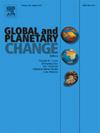Editorial preface to special issue: Applying palaeoenvironmental data to inform resource management and planning
IF 4
1区 地球科学
Q1 GEOGRAPHY, PHYSICAL
引用次数: 0
Abstract
The cornerstone of effective public policy and decision-making relies on robust, fit-for-purpose data that typically extend beyond recent, very short-term monitoring and observation. This is true in fields as diverse as pollution, climate change, climate and geophysical hazards, biodiversity conservation, and water and natural resource management. Accurate, time-stamped data is particularly important when considering the resilience or rates of change that our systems must absorb before thresholds for active intervention are crossed. Fortunately, analysis of palaeo-archives is providing longer-term information prior to observational or monitoring efforts. Longer-term data can be informative as standalone records or can be compiled into regional syntheses underpinning modelling exercises. In this Virtual Special Issue (VSI) entitled Applying palaeoenvironmental data to inform resource management and planning, we compile eight studies that reinforce the value of palaeo-knowledge for appropriate decision-making and policy development. The studies span very different time frames from historical through to deep time and across many different spheres of policy and decision-making. This VSI barely scratches the surface of the potential that palaeo-information can provide when considered with an application-focused lens, and demonstrates the critical importance of long-term datasets for decision-making.
特刊社论前言:应用古环境数据为资源管理和规划提供信息
有效的公共政策和决策的基石依赖于可靠的、符合目的的数据,这些数据通常超出最近的、非常短期的监测和观察。在污染、气候变化、气候和地球物理灾害、生物多样性保护以及水和自然资源管理等各种领域都是如此。当考虑到我们的系统必须在主动干预的阈值之前吸收的弹性或变化率时,准确的、带有时间戳的数据尤为重要。幸运的是,在观测或监测工作之前,对古档案的分析提供了更长期的信息。长期数据可以作为独立记录提供信息,也可以汇编成区域综合数据,作为建模工作的基础。在这期题为《应用古环境数据为资源管理和规划提供信息》的虚拟特刊(VSI)中,我们汇编了八项研究,以加强古知识对适当决策和政策制定的价值。这些研究跨越了非常不同的时间框架,从历史到深度时间,跨越了许多不同的政策和决策领域。当以应用为中心的透镜考虑时,这个VSI几乎触及了古信息所能提供的潜力的表面,并证明了长期数据集对决策的至关重要性。
本文章由计算机程序翻译,如有差异,请以英文原文为准。
求助全文
约1分钟内获得全文
求助全文
来源期刊

Global and Planetary Change
地学天文-地球科学综合
CiteScore
7.40
自引率
10.30%
发文量
226
审稿时长
63 days
期刊介绍:
The objective of the journal Global and Planetary Change is to provide a multi-disciplinary overview of the processes taking place in the Earth System and involved in planetary change over time. The journal focuses on records of the past and current state of the earth system, and future scenarios , and their link to global environmental change. Regional or process-oriented studies are welcome if they discuss global implications. Topics include, but are not limited to, changes in the dynamics and composition of the atmosphere, oceans and cryosphere, as well as climate change, sea level variation, observations/modelling of Earth processes from deep to (near-)surface and their coupling, global ecology, biogeography and the resilience/thresholds in ecosystems.
Key criteria for the consideration of manuscripts are (a) the relevance for the global scientific community and/or (b) the wider implications for global scale problems, preferably combined with (c) having a significance beyond a single discipline. A clear focus on key processes associated with planetary scale change is strongly encouraged.
Manuscripts can be submitted as either research contributions or as a review article. Every effort should be made towards the presentation of research outcomes in an understandable way for a broad readership.
 求助内容:
求助内容: 应助结果提醒方式:
应助结果提醒方式:


